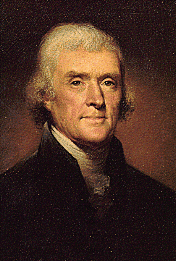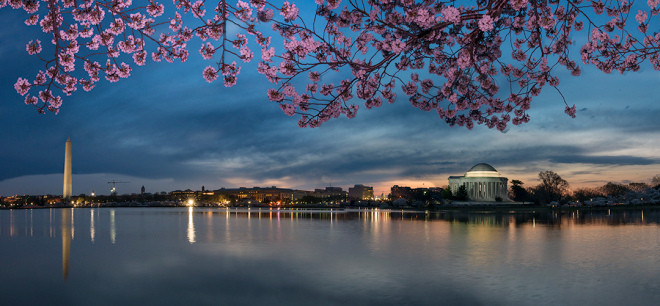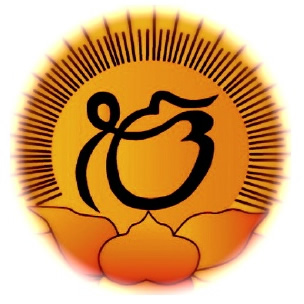  
Thomas
Jefferson

Thomas
Jefferson, 1743 - 1826

Washington Monument (l) and Jefferson Monument (r), Washington, DC
"I
have sworn, upon the altar of God, eternal hostility
against every form of tyranny over the mind of man."
When
Thomas Jefferson's will was read, it stated that there
were only three things for which he wanted to be remembered.
 Author
of the Declaration of Independence (at 33 years of age). Author
of the Declaration of Independence (at 33 years of age).
 Founder
of the University of Virginia. Founder
of the University of Virginia.
 The
Virginia Act for Establishing Religious Freedom. The
Virginia Act for Establishing Religious Freedom.
Thomas
Jefferson accomplished more in his
lifetime of 83 years then 10 men could do in one.
 He
graduated from William and Mary College and became a lawyer. He
graduated from William and Mary College and became a lawyer.
 He
was elected to the House of Burgesses (commonwealth legislature) in
Virginia. He
was elected to the House of Burgesses (commonwealth legislature) in
Virginia.
 He
was elected governor of the Commonwealth of Virginia. He
was elected governor of the Commonwealth of Virginia.
 He
wrote the Treatise for Religious Liberty for
Virginia. He
wrote the Treatise for Religious Liberty for
Virginia.
 He
was the Author-Signer of the Declaration of
Independence (co-authored He
was the Author-Signer of the Declaration of
Independence (co-authored
with John Adams).
 He
was the 1st Secretary of State (under President George Washington). He
was the 1st Secretary of State (under President George Washington).
 He
was the Vice President of the United States (under President John
Adams). He
was the Vice President of the United States (under President John
Adams).
 He
was the 3rd President of the United States, 1801-1809. He
was the 3rd President of the United States, 1801-1809.
 He
purchased the Louisiana Territory from France. He
purchased the Louisiana Territory from France.
 He
sent Lewis and Clark to discover and explore the trail to the Pacific
Ocean. He
sent Lewis and Clark to discover and explore the trail to the Pacific
Ocean.
 He
worked at building his own home, Monticello, during his entire political
career (40 He
worked at building his own home, Monticello, during his entire political
career (40
years).
 He
was the U.S. Ambassador to France, succeeding Benjamin Franklin. He
was the U.S. Ambassador to France, succeeding Benjamin Franklin.
 He
founded and built the University
of Virginia. He
founded and built the University
of Virginia.
 His
library of 8,000 books became the core collection of the Library
of Congress. His
library of 8,000 books became the core collection of the Library
of Congress.
 He
invented tools for writing and farming. He
invented tools for writing and farming.
 He
wrote enlightening correspondence to Adams, Washington, Madison, Franklin
and He
wrote enlightening correspondence to Adams, Washington, Madison, Franklin
and
other Founding Fathers.
 He
rose each day at 3 AM and put his feet in a bowl of ice to invigorate
his nervous system, an ancient yogic practice. He
rose each day at 3 AM and put his feet in a bowl of ice to invigorate
his nervous system, an ancient yogic practice.
 He
was the ideal American, the ideal Democrat and the ideal Renaissance
Man. He
was the ideal American, the ideal Democrat and the ideal Renaissance
Man.
Freckled and sandy-haired, and rather tall and awkward, Jefferson
was eloquent as a correspondent, but he was not a public speaker.
In the Virginia House of Burgesses and the Continental Congress, he
contributed his pen rather than his voice to the Patriot cause.
He
inherited a 5000 acre plantation from his father at what would become
his farm-plantation, Monticello, along with a number of African slaves.
The slaves worked the plantation and they were treated extremely well
by Jefferson.
In that time, tobacco was the number one cash crop in the colonies.
When he inherited the Monticello plantation-farm on the hill in Charlottesville,
Virginia, he removed the tobacco from the soil. He knew it starved
the soil of its nutrients. He then planted potatoes to make the soil
more alkaline. Monticello is the oldest "organic" plantation
in America. Fruits, vegetables, plants, flowers, herbs still grow
there. No cotton!
Jefferson's
favorite beverage was apple cider, though he kept a rare wine collection
in his cellar. He served these wines only to guests.
He
played the violin.
He
was nearly a total vegetarian. He
used meat only as a condiment.
He laid the first parquet floor in America.
He
created a swinging door (the glass and door he invented is still working).
This was done so that when his nieces and nephews came to visit and
were running through the home, when they touched the door it automatically
opened, just like grocery store doors automatically open today.
He loved to hang pictures in his home. They covered almost every inch
of wall space. By today’s standards the home would be considered
cluttered. He believed pictures should be hung not so much for their
qualities as beautiful art, but to tell a story. He mostly had pictures
of famous people such as John Locke, who was an influence in Jefferson’s
life, and busts of Adams, Washington, and Franklin as well.
Jefferson’s
closest neighbor was James Madison, the author of the U.S. Constitution.
John Adams last two words on his death bed were, "Jefferson lives!",
July 4th 1826. Thomas Jefferson died a few hours later.
Editor's
Note: In the election of 1800, Thomas Jefferson and President John
Adams ran the first real political campaign. Although then President
Adams was somewhat progressive and a Congregationalist (now the United
Church of Christ), some say a Unitarian, he ran on being a “Christian”
president. The right-wing of Christianity backed him. The more liberal
establishment and free-thinkers backed Thomas Jefferson. Jefferson
ran on the issue of Religious Liberty. He was labeled an “Atheist”
by some of the major newspapers and evangelical Christians of that
time. Jefferson won the election, and because of his victory, some
would say we have more true religious diversity in our Republic today.
Thank God for Thomas Jefferson.
"Think
about it. You grew your magnificent brain, perhaps the most
complicated thing in the world. And you grew it without even thinking
about it. A supremely intelligent Life Force of unknown origin created
and
sustains this wondrous miracle of life. It's what we refer to as God." Hari Singh
Jefferson's
Virginia Act of 1786
For Establishing Religious Freedom is next.
  
You
Are IT
America
The Beautiful
Each Moment Is A Gift
Religions
of the World
The Questionable Punctuation
The
Declaration of Independence
The
first Thanksgiving Day Prayer
Whatever
happened to the Declaration Signers
Life is like a gift they say...wrapped up for you everyday
Jefferson's
Virginia Act for Establishing Religious Freedom

More Web sites by
KhalsaWebMasters.com
 |